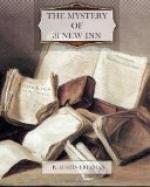“About three thousand five hundred pounds, all invested in Consols. The testator had a pension from the Foreign Office, on which he lived, leaving his capital untouched. Soon after having made his will, he left the rooms in Jermyn Street, where he had lived for some years, stored his furniture and went to Florence. From thence he moved on to Rome and then to Venice and other places in Italy, and so continued to travel about until the end of last September, when it appears that he returned to England, for at the beginning of October he took a set of chambers in New Inn, which he furnished with some of the things from his old rooms. As far as we can make out, he never communicated with any of his friends, excepting his brother, and the fact of his being in residence at New Inn or of his being in England at all became known to them only when he died.”
“Was this quite in accordance with his ordinary habits?” Thorndyke asked.
“I should say not quite,” Blackmore answered. “My uncle was a studious, solitary man, but he was not formerly a recluse. He was not much of a correspondent but he kept up some sort of communication with his friends. He used, for instance, to write to me sometimes, and, when I came down from Cambridge for the vacations, he had me to stay with him at his rooms.”
“Is there anything known that accounts for the change in his habits?”
“Yes, there is,” replied Marchmont. “We shall come to that presently. To proceed with the narrative: On the fifteenth of last March he was found dead in his chambers, and a more recent will was then discovered, dated the twelfth of November of last year. Now no change had taken place in the circumstances of the testator to account for the new will, nor was there any appreciable alteration in the disposition of the property. As far as we can make out, the new will was drawn with the idea of stating the intentions of the testator with greater exactness and for the sake of doing away with the codicil. The entire property, with the exception of two hundred and fifty pounds, was, as before, bequeathed to Stephen, but the separate items were specified, and the testator’s brother, John Blackmore, was named as the executor and residuary legatee.”
“I see,” said Thorndyke. “So that your client’s interest in the will would appear to be practically unaffected by the change.”
“Yes. There it is,” exclaimed the lawyer, slapping the table to add emphasis to his words. “That is the pity of it! If people who have no knowledge of law would only refrain from tinkering at their wills, what a world of trouble would be saved!”
“Oh, come!” said Thorndyke. “It is not for a lawyer to say that.”
“No, I suppose not,” Marchmont agreed. “Only, you see, we like the muddle to be made by the other side. But, in this case, the muddle is on our side. The change, as you say, seems to leave our friend Stephen’s interests unaffected. That is, of course, what poor Jeffrey Blackmore thought. But he was mistaken. The effect of the change is absolutely disastrous.”




